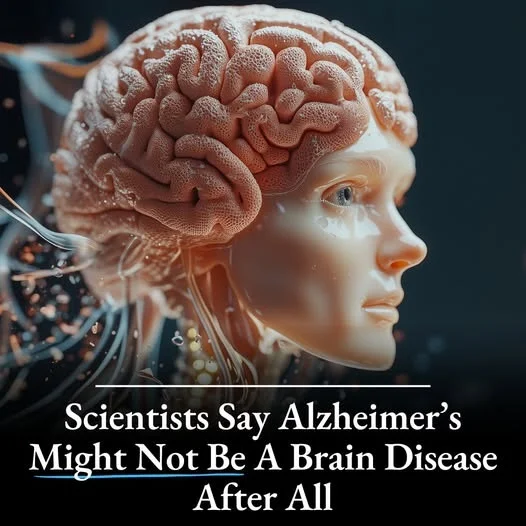Alzheimer’s disease, traditionally known as a neurological disorder caused by the accumulation of beta-amyloid plaques in the brain, is gradually being challenged by a promising new hypothesis. A group of researchers has proposed an intriguing theory suggesting that Alzheimer’s is actually an autoimmune disease, where the body’s immune system mistakenly attacks brain cells instead of protecting them. This marks a significant shift in how we understand this condition, potentially leading to new, promising treatment approaches.
The traditional theory posits that the accumulation of beta-amyloid in the brain is the primary cause of Alzheimer’s disease. However, after more than 30 years of research, scientists have made a surprising discovery: Beta-amyloid is not a “foreign protein” but rather a component of the brain’s immune system, playing a role in protecting brain cells from damage and infection. This is explained by the similarity between the lipid molecules in brain cell membranes and bacterial cell membranes. Therefore, beta-amyloid can be “misled” into attacking the very brain cells it is meant to protect, leading to prolonged brain damage and memory loss.

“By viewing beta-amyloid as part of the immune system, we can better understand the pathophysiology of Alzheimer’s,” Dr. Kantha Shelke, an expert in food science and immunology, remarked. Rather than simply focusing on eliminating beta-amyloid, the autoimmune theory opens up new treatment opportunities that target immune regulation pathways in the brain to reduce inflammation and improve brain function.
The immune system is crucial in protecting the body from bacteria and viruses, but in autoimmune diseases, the body mistakenly attacks its own healthy tissues. Other autoimmune diseases such as rheumatoid arthritis, lupus, and multiple sclerosis share similar mechanisms. If the hypothesis that Alzheimer’s is an autoimmune disease proves to be correct, it would pave the way for a completely new treatment approach for Alzheimer’s patients, targeting not only the beta-amyloid plaques but also regulating the immune system in the brain.
A study published in the Journal of Food Science in 2024 showed that components such as hyaluronan and chondroitin sulfate in chicken bone broth could slow the progression of osteoporosis in animal models. This suggests a connection between food components and neurological diseases, opening new research prospects for Alzheimer’s treatment. Scientists are now not only focusing on reducing beta-amyloid levels but also beginning to consider modulating immune responses in the brain to protect nerve cells.
“It’s true that beta-amyloid plays a protective role in some cases, but if we can regulate the brain’s immune response, we will find more effective cures,” Dr. Abbie Gellman, a nutrition expert from New York, shared.
While the new theory of Alzheimer’s as an autoimmune disease is gaining attention and represents a promising direction, further research is needed to confirm and refine it. However, if this theory is proven correct, it will not only change how we perceive Alzheimer’s but also open a new door to modern treatment methods, offering millions of Alzheimer’s patients a healthier and more hopeful future.


HPX24h > Uncategorized > Why Do Experts Believe Alzheimer’s Is an Autoimmune Disease Rather Than a Brain Disorder?
Tagged Articles
Direct Brain-to-Brain Communication via the Internet
Can Pregnant Women Experience Temporary Memory Loss? The Secrets Behind Brain Changes During Pregnancy
The Secret of the Bee Brain: New Technology Enables Drones to Fly Independently
Recreating the Mouse Brain in a Virtual World: The Future of Neuroscience
Top Reads from This Category
Uncategorized
Bài Tiếng Việt
Discover New Topics
Parenting Tips
The Way to Help Preschoolers Understand How Babies Are Made
Science
New Discovery: How the Brain Manages Emotions and Memory
Healthy Eating
The optimal diet for leaky gut syndrome: Scientific solutions and practical advice
Space
Three Earth-Like Planets That Could Support Life: New Discovery from NASA
Health
Why You Shouldn’t Skip a Protein-Rich Breakfast
Animals
Bee Wax Bust of Nefertiti: The Perfect Fusion of Art and Nature
Science
Laser Therapy Could Help Regrow Your Teeth – Did You Know?
Space
3D Lunar Map: A New Gateway to Understanding the Universe
Fitness
Postpartum Fitness: Secrets to Maintaining an Active Routine for a Quick Recovery
Science
Blood Test: A Breakthrough in Early Detection of Alzheimer’s Disease
Science
Regrowing Adult Teeth in Just 9 Weeks: Science Turns the Impossible into Reality
Healthy Eating
Vegan Diet: An Effective Weight Loss Solution or a Nutritional Challenge?
Healthy Eating
Ways to Reduce Sugar in Your Diet to Prevent Diabetes